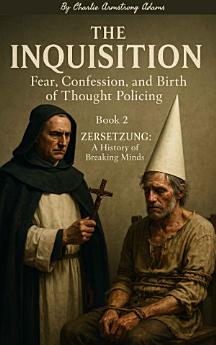The Inquisition: Fear, Confession, and the Birth of Thought Policing
About this ebook
From the Dominican friars of the thirteenth century to the Spanish Inquisition under Ferdinand and Isabella, this book uncovers how the Church built one of the most feared institutions in history — and in the process, invented the blueprint for modern psychological warfare.
What began as a tribunal to punish heresy became the world’s first system of thought policing. Confession was transformed into a surveillance tool, neighbors into informants, and entire communities into maps of suspicion. Ritualized penance, humiliation, and public executions were carefully staged not only to punish dissent but to terrify the masses into conformity. Behind the flames of the auto-da-fé lay a deeper machinery of repression: dossiers, censorship, and the criminalization of private belief.
This book reveals how the Inquisition pioneered methods later perfected by the Gestapo, the Stasi, and COINTELPRO — shifting from burning bodies to breaking minds. By weaponizing fear, confession, and control of conscience, it created the psychological DNA of every secret-police state that followed.
Book Two in the series Zersetzung: A History of Breaking Minds, this volume shows how the Inquisition was not a medieval relic of superstition, but the prototype of modern surveillance and psychological control.
If you want to understand how fear became an institution, how conscience became a crime, and how the lessons of the Inquisition still echo in today’s systems of control, this book will take you to the roots of it all.
About the author
Charlie Armstrong Adams is an independent author, researcher, and investigative writer focused on intelligence history, covert operations, and the intersection of surveillance, power, and society. His work spans multiple volumes, including detailed studies of Cold War spymasters, modern surveillance programs, and the continuity of psychological operations from the Gestapo and Stasi to today. Adams also documents contemporary legal battles and personal testimonies, combining historical analysis with lived experience to expose hidden systems of control. His ongoing projects—across books, multimedia, and documentary-style research—form part of a broader effort to shed light on state secrecy, ideological manipulation, and the struggle for truth in an age of digital inquisition.










